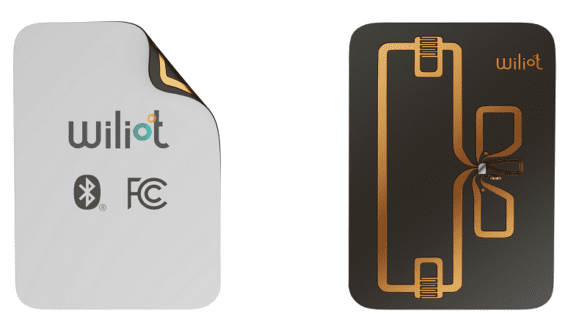Aug 4, 2023Wiliot welcomes former FDA official as traceability advisor
Frank Yiannas, the former deputy commissioner of food policy and response of the Food and Drug Administration (FDA), has joined Wiliot as a strategic advisor.
Yiannas will advise the food and retail markets on the ways in which the ambient IoT, and the real-time, item-level visibility it delivers, can help meet the Food Safety Modernization Act’s Rule 204 obligation that requires the safe tracking of food products and the sharing of traceability data with the FDA and consumers.

“The FDA’s New Food Traceability Rule has become a catalyst for retailers to modernize their supply chains,” Wiliot CEO Tal Tamir said in a news release. “Frank’s leadership in food safety and response will be pivotal in helping us educate the market on how this moment and the adoption of ambient IoT by some of the world’s largest retailers can enable the food business to meet their societal and regulatory traceability requirements.”
Tamir said the Wiliot Visibility Platform provides food retailers with a real-time view into each product throughout its journey from farm-to-store.
“Frank has a unique understanding of how that will transform the food industr — reducing waste, extending shelf life, improving quality, and optimizing labor — while helping retailers maintain FSMA 204 compliance and its mandate for accuracy,” he said in the release.
Ambient IoT is a battery-free wireless technology that is being incorporated in multiple wireless standards, such as Bluetooth, 5G Advanced, 6G, and Wi-Fi — allowing food, medicine and clothing to be connected to the internet and the power of AI at a fraction of the cost of legacy technologies.
The ambient IoT enables a new real-time inventory paradigm that not only benefits compliance and safety, but is the key to more efficient store operations, surviving and thriving in the face of omni-channel competition, and competing on quality as well as value.
Until now, barcode techniques suffered from higher labor costs and low accuracy/compliance, according to the release. Legacy radio frequency identification (RFID) tags have been an option for decades, but the high infrastructure/reader costs have required handheld scanning with limited visibility and accuracy. The ambient IoT is an evolution of this technology using commodity Bluetooth radios instead, leveraging the latest security and sensing, and the ability to interact with the smartphones that are already pervasive in stores.

Yiannas will also advise Wiliot on how to best leverage its platform within the food safety ecosystem to achieve enhanced food safety and traceability. He will collaborate with retail companies to achieve FSMA Rule 204 compliance using the Wiliot platform — while advising on key partnerships with consultants, systems integrators, and applications software vendors to bolster the platform to enable food companies and their software application partners to deliver a comprehensive FSMA Rule 204 solution.
“Modernizing food safety is critical to the health and wellbeing of people everywhere,” Yiannas said in the release. “This goal cannot be achieved without creating greater transparency and traceability throughout the entire food continuum — across farms, food processing and distribution centers, and retail stores. Wiliot, through its pioneering use of ambient IoT, is in a unique position to enable this transparency to become a reality faster and more efficiently than others.
Wiliot’s battery-free postage stamp-sized IoT Pixels, are a game-changer that can significantly help the entire food industry create safer, more traceable supply chains, Yiannas said in the release.
Finalized in November 2022, the FDA’s FSMA Rule 204 rule establishes a foundation for end-to-end food traceability by focusing on tracking food at each step across the supply chain and expands beyond “one-up, one-back” traceability. The goal of Rule 204 is to create visibility within the supply chain to enable a better response to foodborne illnesses, contamination and other public health and safety issues. The rule, which has now been finalized, has a January 2026 compliance deadline.
Yiannas is past president of the International Association of Food Protection. In addition to serving under two different administrations at the FDA, he previously spent 30 years in leadership roles with Walmart and the Walt Disney Co.
Wiliot’s battery-free IoT Pixels can attach to any food product or packaging to connect it to the internet and embed it with intelligence. Once attached, products push out item or case-level information about their location, temperature, carbon footprint and more.
”Frank tends not to focus on vendor solutions, so his appointment is a testament to the merits of this new wave of ambient IoT tools,” Tamir said in the release. “It represents the latest evolution of RFID technology and builds upon its successes in ways that helps retailers to reduce labor costs, increase efficiencies, manage their carbon footprint — all while also achieving FSMA Rule 204 compliance.”
Wiliot is already working with some of the world’s largest food retailers and companies on ambient IoT projects that ensure FSMA Rule 204 compliance, an initiative that will now be accelerated by Yiannas’ appointment.
Top photo: Wiliot’s IoT Pixels, the gray label at the bottom of the crate, require no batteries and can provide location and other information as fresh produce travels from farm to retail. Photos courtesy of Wiliot.









